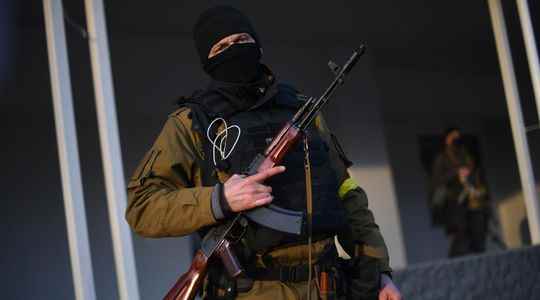The name is strongly reminiscent of the International Brigades of the Spanish Civil War (1936-1939), these military formations made up of foreign volunteers, many of them Communists, who came to fight alongside the Republicans. In order to fight against the Russian invader, President Volodymyr Zelensky urged foreign volunteers to go the opposite way of millions of refugees and come and fight with the Ukrainian army, within a unit created for the occasion: the International Legion.
It was officially formed on February 28, the day the president signed a decree authorizing foreign nationals wishing to join it to enter the territory without a visa. An Internet site was created to direct foreign fighters. “Freedom is a choice”, it is written there. Which is obviously not without risk. Sunday, March 13, at dawn, the Yavoriv military base, located about twenty kilometers from the Polish border, was targeted by Russian strikes. It housed a unit of this International Legion.
- Who can join, and how?
To join the International Legion, volunteers must pass seven stages of recruitment. The first: contact the Ukrainian embassy in their country. They must bring their passport and, if applicable, a document attesting to service in the armed forces or the police. These profiles are preferred. Candidates then pass an interview with a consular attaché and then must file an official request for enlistment with the armed forces. If accepted, he will be provided with “assistance” – the nature of which is not specified – for the trip to a rallying point in Ukraine. The volunteers sign a military service contract on the spot.
- What is the role of this international legion?
The missions of the unit, attached to the Ukrainian regular army, are not further detailed on the recruitment website. “It all depends on the qualifications and experience of each”, explains to France info a Ukrainian diplomatic source. The highly qualified combat profiles have already integrated a special forces unit created for the occasion by the Ukrainian Defense Ministry, he said on March 7. The most inexperienced follow training before being sent into combat.
“This legion can allow Ukraine to benefit from missing specialists and reinforced supervision”, analysis in The cross Edouard Sill, historian, associate researcher at the CNRS and lecturer at the Catholic Institute of Paris. If the Ukrainian unit presents an “ambiguous format, both International Brigades in intention and Foreign Legion in fact”, it allows, according to him, “a certain number of useful options”. In addition to the consolidation of its armed forces, it has made it possible to create “a powerful transnational feeling of sympathy and a conjunction of public opinion frustrated by the impotence felt by their States as well as by international institutions”.
- How many volunteers are there?
In the midst of a communication war between Russia and Ukraine, the figures given are to be taken with caution. Sunday, March 6, during an interview on the American channel CNN, the Ukrainian Foreign Minister, Dmytro Kouleba, reported “nearly 20,000 foreign fighters” volunteers, from 52 countries. “They come mainly from European countries,” he added.
- How will countries react to this call for volunteers?
Not everyone reacted the same way after President Zelensky’s call. Denmark has, from the outset, given the green light to its nationals who wish to enlist in the International Legion. Liz Truss, the British Foreign Secretary, has also positioned herself in this way. But was contradicted, a few days later, by the Chief of Staff of the armies. Admiral Tony Radakin said it was “illegal and unnecessary for the British army and people” to go and fight against the Russian invasion of Ukraine. In France, the Quai d’Orsay advises against “formally to go to Ukraine until further notice”.
Because on the spot, if volunteers are captured during the fighting, Russia has warned: “I would like to officially emphasize that the mercenaries sent by the West to help the Ukrainian regime will not be entitled to prisoner of war status”, a defense ministry spokesman said last Thursday, according to Russian news agency Interfax. This decision goes against Article 4 of the Geneva Conventionrelating to the treatment of prisoners of war.
